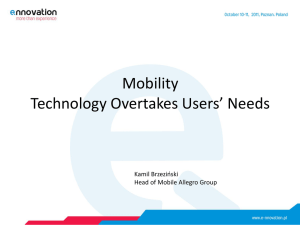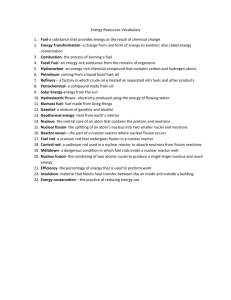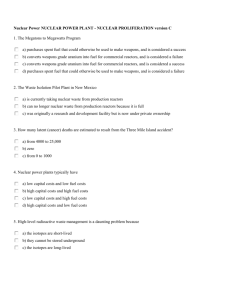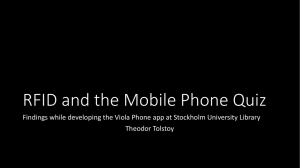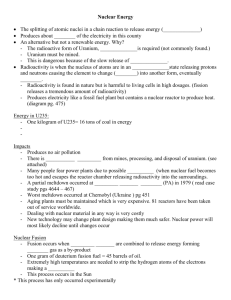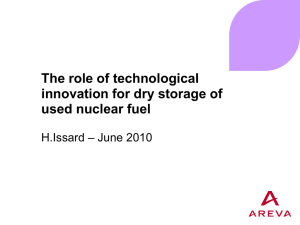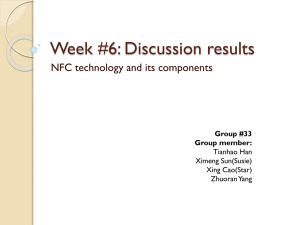Chapter – 2 (Manual – I)
advertisement
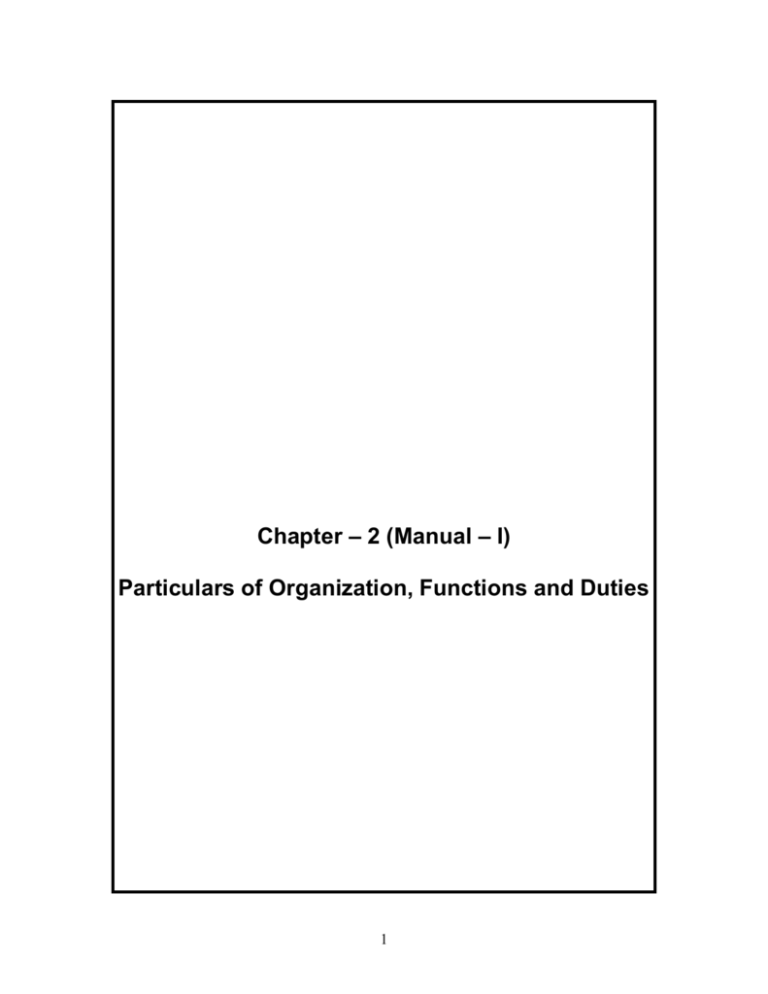
Chapter – 2 (Manual – I) Particulars of Organization, Functions and Duties 1 Chapter 2: Particulars of Organization, Functions and Duties 2.1 Particulars of the Organisation (Objective/purpose of the public authority) The Nuclear Fuel Complex (NFC), established in the year 1971 is a major industrial unit of Department of Atomic Energy, Government of India. The Hyderabad site was selected, recognizing the presence of many Science and Technology Institutions, the industrial infrastructure available and also the advantages of central location with excellent communication links with all parts of the country. The complex is responsible for the supply of nuclear fuel bundles and core components for all the Nuclear Power Reactors in India. It is a unique facility where natural and enriched uranium fuel, zirconium alloy cladding and reactor core components are manufactured under one roof starting from the raw material. 2.2 Mission / vision statement of the public authority India is pursuing a three stage nuclear power programme linking the fuel cycles of Pressurized Heavy Water Reactors (PHWR) and Liquid Metal cooled Fast Breeder Reactors (LMFBR). In addition, Light Water Reactors (LWR) have also been included in the programme in order to achieve the target of 20,000 MWe of nuclear power by the year 2020. From the very inception of the nuclear power programme in India in the mid 1960s, great emphasis has been given towards self-reliance and indigenisation in fabrication of nuclear fuels. Ever since its commissioning in 1971, the Nuclear Fuel Complex (NFC) of Hyderabad is playing a key role in this programme and has been supplying natural and enriched Uranium Oxide fuels and Zirconium alloy core components for all the power reactors in India. Indigenous resources, know-how, and process equipment are being extensively utilized. NFC is perhaps the only facility in the world wherein under the same roof, both Uranium Oxide fuels and Zirconium alloy components are fabricated starting from the basic raw materials namely Magnesium-di-uranate and Zircon sand respectively. So far, NFC has produced more than 3,00,000 fuel bundles for the PHWRs, nearly 3,000 fuel assemblies for the BWRs and a variety of Zirconium alloy components for power and research reactors in India including pressure tubes and calandria tubes for PHWRs. In addition, NFC has manufactured and supplied stainless steel core components for the Fast Breeder Reactor programme, Seamless alloy steel and Titanium 2 tubes and other special high purity materials for both nuclear and non-nuclear applications. NFC has a highly qualified and committed team of Scientists, Engineers and Technicians. This resource is combined with state-of-the-art equipment and technology and total quality management objective, NFC is poised to meet the challenges in the years to come. 2.3 Brief history of public authority and context of its formation The Nuclear Fuel Complex (NFC) of the Department of Atomic Energy (DAE), which has completed its first 30 years, is a unique industrial complex solely responsible for the supply of fuel assemblies and in-core structural components for India’s nuclear power reactors. The decision to establish all the production operations at one location in Hyderabad was taken in 1965 by late Dr Homi J. Bhabha, the then Chairman, Atomic Energy Commission, after due consideration of various alternatives. The construction work at the site, covering about 1200 acres provided by the Government of Andhra Pradesh, was commenced in 1969 and the various units went into operation starting from 1971. The entire Moula Ali area on the outskirts of the city of Hyderabad, founded 400 years ago, which was originally a rocky area and undulating terrain country strewn with boulders, has now blossomed into a busy center with NFC and ECIL located side by side along with the township. The initiative taken by the Department of Atomic Energy has also stimulated industrial development in the entire area and transformed the landscape. The panoramic view of the Plant site and the environs that one can command from the administrative building on top of the hill testifies to all this progress and solid achievement of the three decades. 2.4 Duties of the Public Authority NFC is committed to manufacture and supply high quality: Natural, Depleted, Recycled and Enriched Uranium Dioxide Fuel Assemblies; Thorium Oxide Pellets and Assemblies; Reactor-grade Zirconium Sponge and Zirconium Alloy components for Fuel Assemblies and Core Structurals for Water Cooled Nuclear Power Reactors; Stainless Steel Cladding Tubes, Fuel Sub Assembly Components, Blanket and other Core Sub Assemblies for Sodium Cooled Fast Reactors; Stainless Steel, Special Alloy Seamless Tubes; and High Purity Advanced Material for strategic industries like Atomic Energy, Electronics, Defence, Space, etc. 3 2.5 Main activities / functions of the public authority Production of nuclear fuel bundles for Indian Power Reactors both Pressurized Heavy Water (PHWR) and Boiling Water (BWR) types. Production of Zircaloy reactor core components like coolant tubes, calandria tubes, flow-tubes, fuel tubes, etc. Production of Seamless Stainless Steel Tubes. Production of Fast Breeder Test Reactor (FBTR) core sub-assemblies. Production of very high purity (99.999%) materials for electronic and other industries. 2.6 List of services being provided by the public authority with a brief write-up on them. Nuclear Products : Uranium Oxide Fuel Pellets for Nuclear Power Reactors : PHWR & BWRs Zirconium Alloy Cladding Tubes and Components for PHWR & BWR fuel bundles / assemblies. Zirconium Alloy Structurals for PHWR and BWR cores. SS Cladding Tubes, Hexcans & Core-Assemblies for Fast Breeder Reactors. Non-Nuclear Products : Special Seamless Tubes Stainless steels, titanium alloys, maraging steel, high nickel alloys, zirconium alloys, etc. for power stations, aerospace, marine propulsion, chemical, fertilizer and defence industries. High Purity Materials (Purity 99.999 – 99.9999%) Antimony, bismuth, boron, tribromide, cadmium, gallium, gold, gold potassium cyanide, indium, lead, phosphorus oxychloride, selenium, silver, tellurium, tantalum, tin and zirconium. Special Materials Tantalum & niobium metal ingots, components and powder for strategic use; tantalum and niobium pentoxide powder for cutting tool applications. 4 2.7 Organizational Structure Diagram at various levels at NFC : Chief Executive DCEs/GMs IFA Regional Director, Purchase Chief Admn. Officer Vigilance Officer 2.8 Expectation of the public authority from the public for enhancing its effectiveness and efficiency The public expects that NFC works in a environment that is safe. To reach the expectations of the public, NFC Management accords utmost importance to safety – industrial, radiological, personnel as well as environmental. NFC Management firmly believes and is committed to prevent all injuries. Safety is regarded as a line management responsibility and gets precedence over other production objectives. To achieve this objective, NFC Management is committed to : Observe national and international regulation on safety as applicable Create and maintain a safe and healthy work place Establish safe work-practices Ensure effective safety training Create interest and enthusiasm in safety Develop personal responsibility for safety NFC Management believes that every job can be done safely and without affecting the health of employees. 2.9 Arrangements and methods made for seeking public participation / contribution NFC being an industrial organization, it encourages participation from academic institutions, universities, students as Academic and Industry interaction to promote engineering sciences for their benefit. 5 2.10 Mechanism available for monitoring the service delivery and public grievance resolution. The Government of India has an administrative reforms as well as redress of public grievances relating to the States in general and grievances pertaining to Central Government agencies in particular. The Department disseminates information on important activities of the Government relating to administrative reforms and public grievance redressal through publications and documentation. The Department also undertakes activities in the field of international exchange and cooperation to promote public service reforms. As per the Directives of the Department, the NFC has mechanism to act as a facilitator in consultation with various groups in NFC to redress the grievances of employees and public. 2.11 Addresses of the main office and other offices at different levels Main Office is located at Hyderabad. The address is Nuclear Fuel Complex Department of Atomic Energy Hyderabad – 500 062 Andhra Pradesh Other Offices of NFC located at Mumbai and Pazhayakayal, Tuticorin. Mumbai: Liaison Office Nuclear Fuel Complex Department of Atomic Energy Anushakti Bhavan, CSM Marg MUMBAI – 400 001 Palayakayal: New Zirconium and Oxide Sponge Project Nuclear Fuel Complex Pazhayakayal Post Srivaikuntam Taluq Tuticorin District – 628 152 6 2.12 Working Hours of the Office The Office Hours of Office: The Office Hours of NFC is from 0845 hrs to 1645 hrs. The Complex also works on round-the-clock shifts, which are given below: Opening hours First Shift Closing hours : 0615 hrs to 1415 hrs General Shift : 0845 hrs to 1645 hrs Second Shift : 1415 hrs to 2215 hrs Night Shift 2215 hrs to 0615 hrs : Every Second Monday of the month is observed as closed holiday in lieu of Second Saturday and observe six day week pattern. 7
